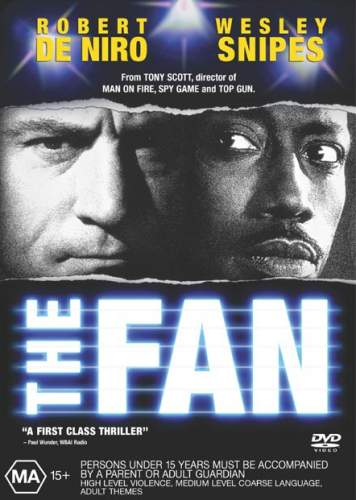The Fan (1996) |
|
The Fan (1996) |
|


|
| BUY IT |
| General | Extras | ||
| Category | Thriller |
Dolby Digital Trailer Trailer-Money Train, Secret Window, Taxi Driver |
|
| Rating |

|
||
| Year Of Production | 1996 | ||
| Running Time | 111:53 (Case: 116) | ||
| RSDL / Flipper | No/No | Cast & Crew | |
| Start Up | Menu | ||
| Region Coding | 2,4,5 | Directed By | Tony Scott |
|
Studio
Distributor |
 Sony Pictures Home Entertain |
Starring |
Robert De Niro Wesley Snipes Ellen Barkin John Leguizamo Benicio Del Toro Patti D'Arbanville Chris Mulkey Andrew J. Ferchland Brandon Hammond Charles Hallahan Dan Butler Kurt Fuller Michael Jace |
| Case | ? | ||
| RPI | $14.95 | Music |
Mark Brooks Jeff Rona Hans Zimmer |
| Video | Audio | ||
| Pan & Scan/Full Frame | None | English Dolby Digital 5.1 (384Kb/s) | |
| Widescreen Aspect Ratio | 2.35:1 | ||
| 16x9 Enhancement |
 |
||
| Video Format | 576i (PAL) | ||
| Original Aspect Ratio | 2.35:1 | Miscellaneous | |
| Jacket Pictures | No | ||
| Subtitles |
English Bulgarian Croatian Czech Greek Hungarian Polish Serbian Slovenian |
Smoking | No |
| Annoying Product Placement | No | ||
| Action In or After Credits | No | ||
"That's why baseball's better than life: it's fair."
I'm a big fan of Tony Scott films and The Fan is no exception. Most recently, Scott has made two of his best films with Man on Fire and Domino, and like so many of the films he's directed in a career spanning over two decades in Hollywood, they were dismissed for the very reasons they are so excellent: a visual style of wide angled lenses, close ups, and rapid editing which creates a fragmented and dynamic collage of imagery; soundscapes and soundtracks as dense as his visuals; and a wry, black humour that often infuses the pulp genres he favours. In The Fan, Scott gets a remarkably tense performance out of Robert De Niro, who makes sure this overwrought melodrama is a thriller with a slow burning fuse. As a man utterly obsessed with the game of baseball, particularly the prospects of his home team the San Francisco Giants, De Niro's character Gil Renard is a man who has gradually lost touch with reality. As the film opens it is only a matter of time before he steps over the edge, but the pain and pleasure of The Fan is watching De Niro bring Gil inexorably to that edge.
Gil's descent into madness is juxtaposed and carefully intertwined with the story of Bobby Rayburn, played with increasingly frayed nerves by Wesley Snipes, an actor often underrated because of some poor film choices. Rayburn is the new star player for the Giants, having been signed for a controversial $40 million, thanks to the canny promotion of his agent Manny (John Leguizamo), a plush deal which puts him at odds with the fans as well as his own team mates, particularly Juan Primo (Benicio Del Toro) who will not relinquish the number 11 for the superstitious Rayburn. Gil is the rare fan that supports the addition of Rayburn to the team, claiming to talkback radio sportscaster Jewel Stern (Ellen Barkin) that the hotshot player deserves two or even three times the amount. If you keep your eyes open, Jack Black appears briefly in the sound booth of the radio station.
Signs that things are not quite right with Gil begin to appear very early on, first when we see him selling hunting knives for a sports distributor, getting more and more frustrated with the dead ends and deadbeats, and then when we see him picking up his young son, Richie (Andrew J. Ferchland), the barely contained hostility to his ex-wife Ellen (Patti D'Arbanville) sets off a few warning bells. Gil takes the day off work to take Richie to the opening day of the season, even though the boss has warned him that his performance is seriously lacking. At the match, Gil is less than the ideal parent, a motor mouth spouting suspect philosophical mantras and affirmations of sportsmanship, combined with fanciful anecdotes of his own sporting credentials, flavoured with a flurry of four lettered words.
The trouble in The Fan is the number 11, because without it Rayburn cannot perform and finds himself in a very awkward and expensive slump. When everything that Gil holds dear is gradually stripped from him, he gets the deranged idea that he will get Rayburn's number back, no matter the cost. As he repeats to his son, you have to be prepared to sacrifice everything for the team, a philosophy that cannot tolerate the seeming avarice and selfishness of Rayburn. Rayburn's world of comfort and security, where the safety of his own young son Sean (Brandon Hammond), is his priority comes undone during a meeting with Gil, when the cracks begin to show, and the extent of Gil's creepy obsession is revealed. If there is a weakness in the film, it is the heavy-handedness of the drawn-out ending. It begins to drag a little during the dénouement, unfortunately emphasised by Hans Zimmer's score.
Watching an actor of De Niro's calibre performing as an unhinged and demented obsessive like Gil is both a delight and an uncomfortable experience. De Niro's work with Martin Scorsese has amply prepared him for the role of Gil, with characters such as Johnny Boy in Mean Streets, Travis Bickle in Taxi Driver, and Rupert Pupkin in The King of Comedy, each film a wealth of crazy tics and mannerisms. There's a look that comes over De Niro's face, and can be seen so clearly in the eyes, that there is something very wrong with this character. And it is also a testament to Ferchland, Hammond, and Snipes that they hold their own so well against De Niro during his unravelling.
This is an excellent transfer, and is only marred by a number of minor problems. It is a 16x9 enhanced transfer in the 2.35:1 aspect ratio, which is the same as the film's original anamorphic ratio.
The overall sharpness is outstanding, which is particularly good in a Tony Scott film where there are a lot of close-ups of faces. At 12:53 - 13:03 there is some notable softness, particularly at the right of the frame, however this is possibly a problem with the original shot, as the shots immediately before and after are perfectly sharp. The colour is very rich and vibrant and there is no problem with colour bleed. Shadow detail is also excellent and there is no low level noise.
There was a mild problem with shimmering during tracking shots over the heads of the baseball fans, such as at 25:53 - 25:56. Aliasing also appears, although it is quite infrequent: 32:49 - 32:50, in two different shots, and at 40:12 - 40:15. There is also a problem with edge enhancement. This is not a big problem, except in scenes of high contrast between foreground and background, where it can be quite noticeable.
The most notable problem with this transfer is the number of film artefacts from the source print. Most of these artefacts show up as white specks, such as at 26:56, 26:57, 29:44, 33:26, 33:43, and from 35:52 - 37:35 there are quite a lot of specks during a scene between Gil and his son, Richie. This trend continues throughout the whole film, but is only mildly distracting. Most of these specks are tiny and only appear for a fraction of a second each.
The subtitles were quite accurate, and only occasionally dropped a word, name, or swear word.
I was surprised I hadn't noticed the layer change on this disc, until I realised it was only a single layer disc. That being the case, I'm very surprised there were no notable compression problems to be found either.
| Sharpness | |
| Shadow Detail | |
| Colour | |
| Grain/Pixelization | |
| Film-To-Video Artefacts | |
| Film Artefacts | |
| Overall |
There is only one audio track, which is an English Dolby Digital 5.1 encoded at 384 Kb/s. As you would expect from a Tony Scott film, the audio is as relentless as his visuals, from his pumping soundtrack of The Rolling Stones and Nine Inch Nails tracks to his use of an effects-driven soundscape. Even though it is a lower bit rate Dolby track, it is still fantastic and completely immersive.
The dialogue quality is very good, as is the audio sync. Occasionally, some words are easily missed, which is not too surprising when you have Benicio Del Toro and John Leguizamo in your cast. The subtitles usually prove it was only a simple word or phrase.
Other than the prominent use of famous rock and roll, particularly The Stone's classics, such as Sympathy for the Devil, Start Me Up, and Gimme Shelter, the score is credited to Hans Zimmer. In recent years, Zimmer has come to prominence as one of the leading composers working on big budget Hollywood films, such as Gladiator, The Thin Red Line, and Batman Begins. In The Fan, most of his music is the incidental music to fill in the gaps between the rock and roll, however it does come to the foreground when the drama requires it.
The rears mainly support the music in this film, however they are also called upon for atmospheric effects, such as the weather or crowd noises in the stadium sequences. The subwoofer is also very active throughout the film.
| Dialogue | |
| Audio Sync | |
| Clicks/Pops/Dropouts | |
| Surround Channel Use | |
| Subwoofer | |
| Overall |
The menu is a static 16x9 image, which is a collage of De Niro's and Snipes' faces, and there is no music.
Trailers
There are three trailers here, none of which are for The Fan. They are Money Train, Secret Window, and Taxi Driver.
NOTE: To view non-R4 releases, your equipment needs to be multi-zone compatible and usually also NTSC compatible.
The Fan was released in Region 1 on December 10, 1997, but unfortunately I could find no reviews of this disc. According to Amazon, it is a two sided disc (I think), with a 4x3 transfer on one side and a 16x9 enhanced transfer in the original 2.35:1 aspect ratio. It has four audio tracks: an English Dolby Digital 5.1, plus English, French, and Spanish Dolby Digital 2.0 surround encoded tracks. No information is available about the bit rate for those tracks. It also comes with English and Spanish subtitles. It does not seem likely that the Region 1 would have a better transfer, so unless you want the foreign audio tracks or the 4x3 video you might as well stick with the local disc. I'm calling it even.
The video quality is excellent, and only marred by edge enhancement and minor film artefacts.
To match the excellent video transfer is an equally excellent 5.1 audio mix.
There are no extras.
| Video | |
| Audio | |
| Extras | |
| Plot | |
| Overall |
| Review Equipment | |
| DVD | Philips 860, using RGB output |
| Display | Sony 76cm FD Trinitron WEGA KV-HX32 M31. Calibrated with Digital Video Essentials (PAL). This display device is 16x9 capable. |
| Audio Decoder | Built in to amplifier/receiver. Calibrated with Digital Video Essentials (PAL). |
| Amplification | Sherwood |
| Speakers | Sherwood |